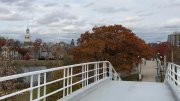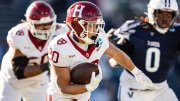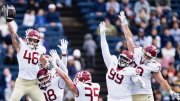Had T.S. Eliot '10 written a senior thesis at Harvard, he might have realized that March, not April, is the cruelest month. For the three out of five seniors who write honors theses, March is the period of greatest stimulus and stress.
Most seniors have love-hate relationships with their theses. Since their topics are often of deep personal and intellectual interest, many feel frustrated by departmental page limits and deadlines. And with the "real world" looming like a bully, seniors often take the outcome of their theses as a measure of how they will fare after graduation.
The variegation of thesis topics among seniors I've talked with is striking enough. But when you consider the hundreds of theses being written, trying to contemplate the scope and fervor of the entire process is a bit mind-boggling. David Ciocon '94, for example, is writing "Walt Whitman: Public Health and the Sanitization of the American Market" as his thesis in history and literature, and is examining some of Whitman's lesser-known pieces of journalism about public health. According to Ciocon, Whitman believed that unsanitary living conditions in New York City reflected growing differences in American class structure.
Ciocon, a pre-med, became interested in the topic while trying to combine his interests in medicine and in history and literature. "My thesis is a kind of nexus of my two interests," Ciocon says. In researching his topic he consulted not only Whitman's poetry, the criticism that's been written about it, and Whitman's journalism, but nineteenth-century medical textbooks as well.
Theses invariably become cynosures of mental activity the month before they are due. "People think I'm really rude at meals. I'll start spacing out and won't hear what they're saying, but it's really just that I'm having an idea," says Ciocon. "Doing a thesis is a really good idea. You learn to organize yourself and sharpen your writing. And you have more of a personal investment because you've worked at it so long. It's the culmination of all you've learned in the department."
With history and literature theses due March 4, the earliest deadline at Harvard, Ciocon is worried not so much about finishing as about squeezing all he has to say into the forty-tosixty-page limit. "It doesn't help that February is a short month," he says. "It's not a leap year, is it? I was hoping it was."
Sabrina Corlette '94 is also writing a history and literature thesis. As a varsity swimmer, she has had to complete it by February 22 in order to swim in the Eastern Sprints meet in late February with a clean conscience and a focused mind. Corlette is examining late-nineteenth-century views of ethnicity and social Darwinism by studying the Immigration Restriction League. Her enthusiasm for her thesis is apparent: "It's something real, something I have to show for my time at Harvard."
The anti-immigration movement that Corlette is writing about was born at Harvard. The organization was run by students and alumni, and one of its first presidents was professor John Fiske, a historian. "My third chapter talks about Harvard professors and what they were teaching, such as Aryan superiority," says Corlette. "The undergrads took this away with them. They believed people from Southern and Eastern Europe were inherently illiterate, and so they started this movement. The league began as a fringe group and then grew and grew." Corlette says her thesis has made her think about her own intellectual growth at Harvard and about what students today take away with them when they graduate. "Harvard is still a breeder of leaders of American social and cultural life," she says. "And you wonder what it's producing."
Economics concentrator Jonathan Hsu '94 is writing his thesis, due in late March, about the credit crunch on small businesses in the 1990s. After starting a new teen magazine, Inside Edge, with several roommates, Hsu says he has firsthand knowledge of his topic. "I'm trying to show how the recent recovery is more sluggish than it should be, since the Small Business Administration and banks have tightened loans to small businesses. The recovery has been stifled because small businesses are the engine of the economy. No one's ever really done this topic before."
Hsu is excited about his topic but less pleased with his department's advising system. "It's not as fulfilling an experience as I thought it would be," he says. "It's definitely not the be-all and end-all in academics. There are too many students in Ec and too few faculty. The resources are spread too thin. Every Ec professor has to advise five or six students, and this adds to the harried atmosphere. Everybody is panicking over their topics, their professors, their data. The thesis feels more like a weeding-out process than anything else. There's no encouragement, no safety net like in smaller concentrations."
History concentrator Masood Farivar ’94 is analyzing the debate between faith and reason in the works of St. Thomas Aquinas in the light of the Islamic influences on Aquinas's work.
His thesis is due March 24. Originally from Afghanistan, Farivar knew nothing of Western culture before coming to the United States five years ago. He is fascinated by the influences of Islamic thought on medieval Western philosophy.
"I've always been interested in the world we know as West and the Islamic East," says Farivar. "I'm asking now what each has contributed to the other. If it wasn't for Islam, the West would never have recovered the works of the Greeks, especially Aristotle. In the thirteenth century these works were transmitted back. Islamic philosophy was taught at the University of Paris, at Oxford, and at Bologna. A degree of openness existed then, but the situation is very confused now."
Farivar finds the issue of faith versus reason particularly important to Islamic culture today. He believes that the outright rejection of modern science by fundamentalist
Muslims as something Western and therefore corrupt is damaging to Islamic culture. The reconciliation of faith and reason in the West, believes Farivar, "is the cornerstone of Western superiority." Tackling this question in his thesis "has been my most important intellectual experience at Harvard. It's very challenging."
While some theses may require the analysis of centuries-old thought, others examine more current topics. Rachel Cohen '94 is writing her social studies thesis, due March 24, on the comic strip "Doonesbury." She expects the thesis to include six interrelated essays and to total about 120 pages.
"There are all sorts of different media voices in 'Doonesbury,'" says Cohen. "Movies, newspapers, radio, press conferences, TV. You even have the question of what medium 'Doonesbury' itself is. Is it entertainment or news? It's very political, and a lot of what is reported in it is news. Gerald Ford even said, 'There are only three vehicles to keep us informed as to what's going on in Washington: the electronic media, the print media, and "Doonesbury," not necessarily in that order.' It's a boundary-crossing cartoon. You often have a White House that is presented as a stage set with various props. 'Doonesbury' points out the very constructedness of the cartoon and politics." Cohen conceived the idea for the thesis after writing an essay on Garry Trudeau's comic strip for a junior tutorial on pop culture. "Whenever I tell people what I'm doing, I always get a smile," she says. "It's an easy-access thesis."
Having read through almost the entire 25 years of "Doonesbury" strips, Cohen has spent much of the semester lying in bed taking notes. "My roommates get really jealous when they hear me chortling away in my room, and they know I'm thesising," says Cohen. "There's always so much to read and it's so much fun! It's just so much fun."
In some theses creativity is not limited to academic analysis. Randall Eng '94 has been composing his own musical a few hours a week since April of his sophomore year. Collaborating with him are Julia Sullivan '86, who helped write the story, and Amanda Schaffer '95, who wrote the lyrics. Eng has two deadlines. The score and stage directions are due in the music department around April 20, and the show is to be performed at Harvard on May 5-7 and 12-14.
"The musical, as it's planned now, will have fourteen songs and three acts, and should last over two hours," says Eng. "It's not a dialogue-heavy show, but there's a lot of music."
Eng's show, which is titled A House Divide/'/, revolves around the plight of a university professor in the McCarthy era who refuses to take a loyalty oath. "But he refuses to take it for the wrong reasons. He thought he would become a hero and he didn't think too carefully about the consequences," explains Eng, who plans to become a professional composer.
"The fact that this is a thesis is incidental to me," he says. "I've already written the music for two Hasty Pudding shows, and I've always wanted to do something on a larger scale. That's what I want to do in real life. I mean, it's great they're letting me do it as a thesis, but I probably would do it anyway, even if I weren't getting credit."
Not all science concentrators have to write theses to graduate with honors, but most are required to do lab work. Michael Lampson '94 took the Physics 191r laboratory course fall semester. It required completion of three experiments, and the resulting lab reports each totaled about 25 pages—altogether, the length of a good-sized thesis.
Pointing out the difficulty of doing real scientific research at the undergraduate level, Lampson says, "In order to do a thesis in physics, it has to be something obscure, and that's not really so interesting. The things we did were more relevant." Choosing among a score of possible experiments, Lampson and lab partner Douglas McLellan '94 measured the relativistic mass of the electron, the thermal noise in resistors, and the ratio of Planck's constant to the square of the electron charge. The data for their last experiment was off uniformly by almost exactly a factor of two, sending the experimenters into a frenzied hunt for the error in their measurements. "What's even stranger is that in our first experiment everything was off by a factor of 1.3," muses Lampson.
Asked whether the lab experience gave him a feel for what it's like being a physicist, Lampson responds, "Yeah, for experimental physics—it's a pain in the ass. Figuring out what's not working is the hardest part. It's very time-consuming. I'd say it was more work than my other three classes combined. But that doesn't mean you shouldn't do it. Writing up the labs is valuable experience if you're going to grad school."
In contrast to physics, biology offers more leeway for original undergraduate research. For her bio thesis, due April 14, Rula Harb '94 is examining the effects of strain and increased loading on bone remodeling. Her experiments required three goats, which Harb kept at the Concord Field Station, a Harvard laboratory. Her control goat led a normal goat life. "He ran around in a pasture and did whatever goats do," explains Flarb. Her second animal led the life of a slothful goat, eating soft foods and staying indoors all day on a bed of hay.
The third goat was fed hard foods and was exercised on a treadmill five days a week for an hour and a half a day. "It was a pretty fit goat by the end," says Harb. "It was hard to train it to run on the treadmill. I tried food, but that didn't really work. The one goat who doesn't like food would be my goat. The animals are pretty unpredictable. They had no qualms about going to the bathroom on the treadmill. And I had some funny experiences trying to capture one in a meadow in Concord. I'm glad I didn't have to put them to sleep. I got kind of attached to the animals."
The goats, since euthanized, were injected with dyes that show up in various parts of their bones. Harb was then able to study bone samples under a microscope.
Harb has been working with a professor at the Museum of Comparative Zoology and hopes that her experiments will link certain behaviors to bone structures. "Astronauts' bones, for example, change their shape and density in space," says Harb. "My professor would like to look at fossils, like dinosaurs, and deduce their life behaviors from their bones. And we can do the same thing for early humans."
Harb has had a longstanding interest in orthopedics and is now applying to medical school. But her thesis has been her life in the past months. "It's been more important than any of my other courses," she says. "It's been really rewarding."








